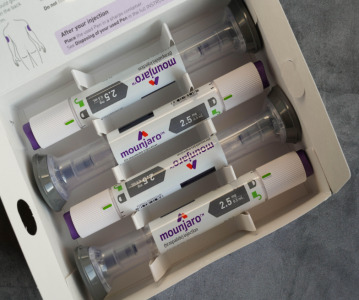Health Canada approves Jardiance tablets for adults with type 2 diabetes

Jardiance lowers the renal threshold for glucose, which leads to reduced renal reabsorption of filtered glucose and increased urinary glucose excretion.
Boehringer Ingelheim (Canada) Ltd and Eli Lilly Canada have announced that Health Canada has approved Jardiance (empagliflozin) to be used as an adjunct to diet and exercise to improve glycemic control in adult patients with type 2 diabetes.
Jardiance belongs to a new class of agents called sodium glucose co-transporter 2 (SGLT2) inhibitors that have a different mechanism of action from other oral glucose-lowering agents. Jardiance lowers the renal threshold for glucose, which leads to reduced renal reabsorption of filtered glucose and increased urinary glucose excretion.
"Although there are many medications available for the treatment of type 2 diabetes, one in two people are not achieving the recommended glycemic goals," says Dr Ronald M. Goldenberg, Endocrinologist at LMC Diabetes and Endocrinology in Thornhill, Ontario. "The approval and availability of Jardiance gives Canadian physicians another option to help improve glycemic control."
Empagliflozin was studied as a single agent (monotherapy) and in combination with other antidiabetic medications, including metformin, metformin and sulfonylurea, pioglitazone (with or without metformin), and basal and prandial insulin (with or without metformin).
Empagliflozin was also studied in patients with type 2 diabetes and cardiovascular disease, and in patients with different degrees of renal impairment.
Treatment with empagliflozin resulted in statistically significant improvements from baseline at Week 24 in HbA1c, fasting plasma glucose (FPG), and body weight across a range of background therapies. In the double-blind placebo-controlled extension of these studies, reductions of HbA1c and body weight were sustained up to Week 76. HbA1c reductions were also seen across subgroups including gender, age, race, duration of disease, and baseline BMI.
In clinical studies, the most common adverse event with empagliflozin was hypoglycaemia, which depended on the type of background therapy used in the respective studies. Other common adverse events included urinary tract infections, genital mycotic infections, increased urination, upper respiratory tract infections and dyslipidemia.
Related News
-
News The next 15 drugs up for negotiation with Medicare include several blockbusters
By now, everyone is quite familiar with the drug price negotiations taking place between drug companies and the Centres for Medicare & Medicaid Services (CMS) in the USA as part of measures being taken to reduce the cost of drugs for patients, to make ... -
News PSCI Welcomes Delpharm, Samsung Biologics, and Suven as First Supplier Partners
The pharmaceutical industry continues to evolve with an increasing focus on responsible sourcing, sustainability, and collaboration across the supply chain. Under a new model to recognise suppliers within the pharmaceutical and healthcare industry that... -
News Drug prices agreed upon as part of the US Inflation Reduction Act
The Inflation Reduction Act brought into constitution by the Biden administation in 2022, which proposed a drug price negotiation between the government and pharmaceutical companies, has reached it's first agreement. -
News Eisai Alzheimer’s drug authorised in UK but still faces obstacles
In partnership with BioArctic AB, pharmaceutical company Eisai has been granted Marketing Authorisation by the Medicines and Healthcare products Regulatory Agency (MHRA) for its Alzheimer’s disease drug product Leqembi. -
News Eli Lilly's weight loss drugs removed from the FDA's shortage list
The US FDA have recently updated their drug shortage list. The recently released list shows that all dosage forms of Eli Lilly's weight-loss drug Zepbound and their diabetes drug Mounjaro are now available. -
News Global advancements in the diagnosis and treatment of rare diseases: Rare Disease Day 2024
Rare Diseases Day is celebrated on the 29th February 2024 and represents the plight of rare disease patients to gain diagnosis and access to suitable treatment. -
News Pharmaceutical industry supports COP28 health stance in joint statement
As COP28 takes place over this week in Dubai, UAE, several bodies in the pharmaceutical and health industries have come together to announce support of key movements in sustainability in the sector, and to recognise sustainability as a health issue.&nb... -
News Biden backs Cold-War measures to shore-up medical supply chains
In a recent strategy to combat rising inflation and the cost of living crisis, President Joe Biden has invoked a Cold War-era act to increase investment in a selection of medicines and supplies.
Recently Visited
Position your company at the heart of the global Pharma industry with a CPHI Online membership
-
Your products and solutions visible to thousands of visitors within the largest Pharma marketplace
-
Generate high-quality, engaged leads for your business, all year round
-
Promote your business as the industry’s thought-leader by hosting your reports, brochures and videos within your profile
-
Your company’s profile boosted at all participating CPHI events
-
An easy-to-use platform with a detailed dashboard showing your leads and performance



.png)



